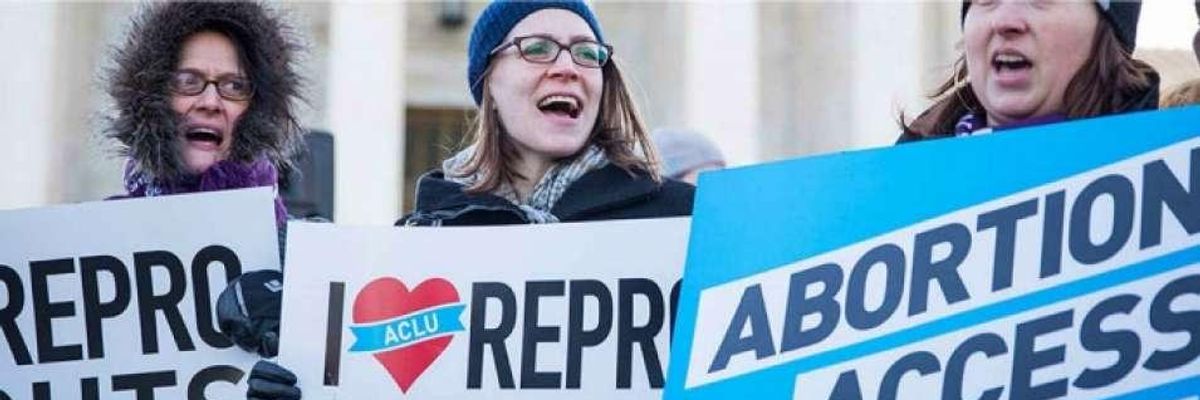Today - January 22 - is the 45th anniversary of the Supreme Court ruling in Roe v. Wade, which recognized abortion as a constitutional right.
This year, as in every other, the media has focused coverage on the annual anti-abortion demonstration in Washington, even though it is not news. Clearly, there's nothing new or noteworthy about that.
What's different about the Roe anniversary this year is the newly proactive abortion rights movement.
Today, lawmakers from 25 states and 3 localities join together to announce they will introduce legislation to affirmatively protect women's fundamental right to abortion. This nationwide demonstration of resolve is just the beginning for 2018. Importantly, it's part of a larger movement-wide effort to take the offense on abortion rights.
In 2016, there were 81 proactive abortion rights measures introduced in 25 states. Last year, that increased to 133 measures in 33 states and four localities. This year, the Public Leadership Institute is pushing to increase the number of proactive bills and resolutions to 200 in nearly 40 different states.
Part of the reason for this increase is the distribution of the Public Leadership Institute's Playbook for Abortion Rights--the great majority of the policies introduced are similar to model bills published in that book. And part is the energy generated by the Women's March and subsequent organizing for women's rights.
This effort for the proactive is far from a symbolic. Just over the past year:
- Oregon enacted HB 3391, the Reproductive Health Equity Act, which requires health insurance policies across the state to cover abortion, as well as contraception and other reproductive health services, at no cost to the patient.
- Illinois enacted HB 40, which provides Medicaid funding for most abortions, as well as insurance coverage of abortion for state employees.
- Hawaii enacted SB 501, which requires anti-abortion crisis pregnancy centers to post and distribute notices about the availability of abortion and reproductive health services in the state. Crisis pregnancy centers are anti-abortion offices disguised to look like medical clinics which offer services such as pregnancy tests and prenatal sonograms, and lie about medical facts, all in an effort to stop women from having abortions.
- Maryland enacted SB 1081, which provides financial support to abortion clinics if federal funding is cut. And California Treasurer John Chiang created a program similar to Maryland's, making Community Clinic Lifeline Grants available to facilities that provide abortion services.
- Delaware enacted SB 1, which guarantees the right to abortion under the Roe v. Wade decision. The law also repeals obsolete anti-abortion statutes.
Many of the bills announced today are similar to the new Delaware law. They would "codify" Roe, meaning they would write the constitutional right to abortion into state statutes. This is because the Supreme Court is just one justice's death or retirement away from reversing Roe.
If that ruling is overturned, individual states would decide whether women have access to legal abortion and, at present, only 17 states protect the fundamental right to abortion in their statutes or constitutions. In this potentially decisive election year, it is crucial to understand that such legislation is not just essential policy, it's extremely good politics. Polls consistently show that about 70 percent of Americans support Roe.
Our allies in the states say it better than I can: "Protecting abortion rights is essential to women's freedom, privacy and health. We've had enough of the attacks. Women deserve better," insists Michigan State Senator Rebekah Warren. "We have fought for 45 years to protect the right to abortion under Roe, and we are ready to fight another 45," declares NARAL Pro-Choice Missouri's Executive Director, Alison Dreith.
So let's all do more than demonstrate. And let's not confine ourselves to opposing regressive legislation. It is time to fight for proactive measures that represent our values, the kind of policies that make news, put our opponents on the defensive, and excite Americans who care about women's rights.




